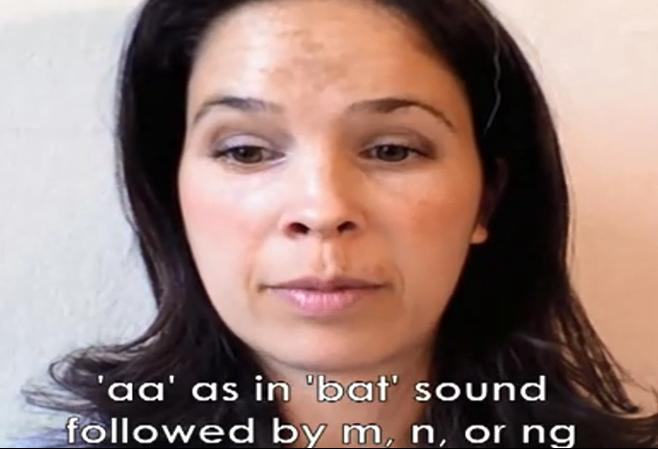To me, the sounds like the exact same vowel sound preceding the ng, NG consonant sound.
对我来说,发音听起来就像是ng前面的元音,NG辅音。
Anger, danger, ang, ang.
Anger、danger、ang、ang。
Now, in IPA, the word anger is written with the 'aa' as in 'bat' sound, followed by the 'ng' sound.
在IPA中,“anger”这个词是用“bat”中的“aa”书写的,后面跟“ng”音。
In IPA the word danger is written with the 'ay' as in 'say' diphthong.
在IPA中,单词“danger”是用双元音say中的“ay”书写的。
And as I've just said, to me, to my ear, these sounds are exactly the same.
就像我刚才说的,对我来说,我听到的这些声音完全一样。
Anger.
Anger。
So, when the 'aa' sound is written in IPA, followed by the NG sound, as in anger,
所以,用IPA书写“aa”,后面是NG音时,比如在anger这个词中,
it is really pronounced much more as the 'ay' as in 'say' diphthong.
它的发音实际上更像是“say”中的双元音“ay”。
A few more examples: hang, bang, language, fang.
再举几个例子:hang、bang、language、fang。

So, the IPA is not a perfect tool.
因此,IPA并不是一个完美的工具。
It doesn't capture every sound within a language perfectly.
它不能完美地捕捉语言中的每一个发音。
And that is understandable, as language is such a complex thing.
这是可以理解的,因为语言非常复杂。
So the lesson here is when you read a word written in IPA with the 'aa' as in 'bat' sound,
所以经验是,当你读一个用IPA书写的单词时,里面带有“bat”中的“aa”音,
followed in the same syllable by an M or an N consonant sound,
后面跟着有M或N辅音的同一个音节时,
it is actually pronounced as a modified aa sound going into a schwa making a diphthong-like sound.
它实际上是一个经过调整的aa音,转换成schwa音,发出一个类似双元音的音。
And that modified aa is one in which the jaw does not drop quite as much and the corners of the mouth do not come back and up quite as much.
而调整过的aa音,发音时下巴不会下降太多,嘴角不会来回上扬多次。
When you see the 'aa' as in 'bat' sound followed by the ng NG consonant sound, within the same syllable,
当你看到在同一个音节中,“bat”中的“aa”音后接“ng ng”辅音时,
it is pronounced as the 'ay' as in 'say' diphthong.
它的发音是“say”双元音中的“ay”。











